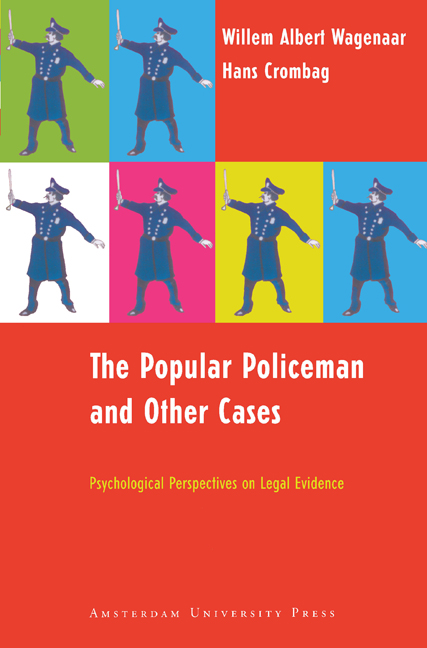Book contents
- Frontmatter
- Contents
- Foreword
- 1 Illegal Gambling or the Victory Travel Club
- 2 On Causal Reasoning or Death in the Warmoesstraat
- 3 Consumer Confusion or Potato Chips and Olive Oil
- 4 Fiction and Reality of ‘the Average Individual’ or the Case of Old Mr. Lane
- 5 Case Histories and Scientific Proof or the Case of JR
- 6 Not a Good Story or the Disappearance of Maddy and Vicky
- 7 Conflicting Scenarios or the Case of the Man who Needed a Companion
- 8 Two Processes Obstructing the Accuracy of Long-Term Memory or the Case of the Stolen Mercedes
- 9 Confessions after Repeated Interrogation or the Putten Murder Case
- 10 Collaborative Storytelling or the Artist’s Models and an Angry Neighbourhood
- 11 Allegation of Sexual Child Abuse in a Case of Disputed Visitation or Cindy's Story
- 12 Psychogenic Amnesia or the Case of the Amnesic Strangler
- 13 Obeying Reflexes or Death on the Climbing Wall
- 14 Visual Acuity or Shooting Mimi the Cat
- 15 Sexual Semiotics or the Case of the Popular Policeman
- Postscript: Psychological Expertise and the Law
- Bibliography
- Name Index
- Subject Index
Postscript: Psychological Expertise and the Law
Published online by Cambridge University Press: 16 February 2021
- Frontmatter
- Contents
- Foreword
- 1 Illegal Gambling or the Victory Travel Club
- 2 On Causal Reasoning or Death in the Warmoesstraat
- 3 Consumer Confusion or Potato Chips and Olive Oil
- 4 Fiction and Reality of ‘the Average Individual’ or the Case of Old Mr. Lane
- 5 Case Histories and Scientific Proof or the Case of JR
- 6 Not a Good Story or the Disappearance of Maddy and Vicky
- 7 Conflicting Scenarios or the Case of the Man who Needed a Companion
- 8 Two Processes Obstructing the Accuracy of Long-Term Memory or the Case of the Stolen Mercedes
- 9 Confessions after Repeated Interrogation or the Putten Murder Case
- 10 Collaborative Storytelling or the Artist’s Models and an Angry Neighbourhood
- 11 Allegation of Sexual Child Abuse in a Case of Disputed Visitation or Cindy's Story
- 12 Psychogenic Amnesia or the Case of the Amnesic Strangler
- 13 Obeying Reflexes or Death on the Climbing Wall
- 14 Visual Acuity or Shooting Mimi the Cat
- 15 Sexual Semiotics or the Case of the Popular Policeman
- Postscript: Psychological Expertise and the Law
- Bibliography
- Name Index
- Subject Index
Summary
The basic problem of introducing psychological expertise in the framework of a legal trial, civil or criminal, is that it almost inevitably causes a clash of disciplines. Legal decisions are made on the basis of the law, either statutory or common, and interpretations of the law according to legal scholarship. Psychological interpretations of the law are irrelevant in a context in which primacy rests with another discipline. Because of the large and fundamental differences between psychological science and legal scholarship, it is often questionable whether it serves any purpose for courts, judges, and juries to take notice of psychological expertise. Clearly, a set of rules is needed for the way in which only selected elements of psychological reasoning can find a place within the often doctrinaire structure of the law. What then is the difference between the approaches of the two disciplines?
Legal scholarship is axiomatic
Among the scientific disciplines, legal scholarship resembles mathematics more than any other discipline does. Legal reasoning is based on a particular ordering of reality that makes it possible to place concrete events, situations or actions in fixed categories for which legal rules have been developed .As an example, take the problem of force majeur, discussed in chapter 13. It is concerned with situations in which people, through conditions beyond their control, can react in only one possible manner. If that reaction constitutes a violation of the law, should it be punished? Traditionally, a distinction is made between vis absoluta and vis compulsiva (cf. Cleiren & Nijboer, 2000, Art. 40). The first is a strong form in which there simply was no deliberate choice. An example is being pushed in a dense crowd and thereby injuring another person. The second is a weaker form, in which there was a choice in principle, but the situation was such that all options except one were virtually impossible. A well-known example is self-defence when one's life is threatened. In the class of vis compulsiva, again two subclasses can be distinguished: situations in which a severe pressure made it impossible to weigh the alternatives, versus situations in which there is a dilemma, characterised by the fact that all available choices involve behaviour proscribed by the law.
- Type
- Chapter
- Information
- The Popular Policeman and Other CasesPsychological Perspectives on Legal Evidence, pp. 251 - 262Publisher: Amsterdam University PressPrint publication year: 2012



